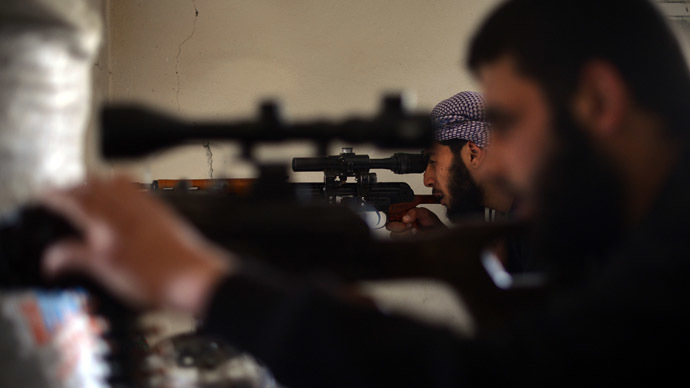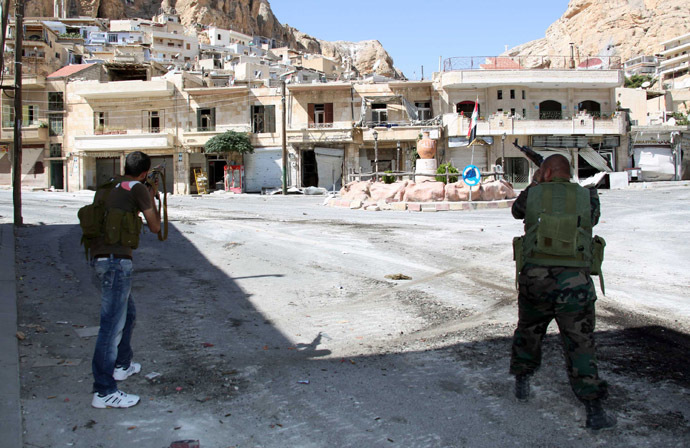Syria to meet chemical disarmament deadline, despite delays due to security

Despite the delays, the Syrian government can fulfill its obligation to destroy all chemical weapons and materials by a set deadline, Jonathan Steele, a columnist for the Guardian told RT, adding that only a political solution will resolve the conflict.
RT:Syria maintains it will be able to meet the UN-backed roadmap, and will give up all of its chemical weapons by June. Does that look realistic at this stage?
Jonathan Steele: Yes I think it is. I mean it is 4.5 months away. It is quite a long time and the UN diplomat in charge of this whole operation also thinks that it’s going to be done by June 30. So there is no real sense of alarm that they will miss it.
RT:Radical rebel factions have refused to recognize the disarmament deal - is there any way they could get their hands on chemical weapons now?
JS: I think it is fairly unlikely and they are well guarded. There are security problems. The country is in the middle of a civil war. Again as the UN diplomat said to the Security Council the other day – the reasons for the delay are security concerns and that sounds quite legitimate and plausible.
RT:Peace talks have hit a brick wall in Geneva. Neither side of the conflict is making concessions - what will it take for them to budge?
JS: I think it will take the realization on both sides, that there is no military solution that neither side can win. I think that is obvious to any independent observer. But it is hard for sides to admit that they had spent all this money and treasure and lost lives for not getting victory, and so they still cling to that hope. But I think that over time, with the UN pressure from Lakhdar Brahimi, if the regional countries start convincing the government and the opposition that they must make a deal with it, than that would help. It also means cutting back on arms supplies and all these jihadi fighters going in and stopping it being proxy war and reverting it to what it should be, just an internal problem among Syrians.

RT:Fractured rebels in Syria, they do not enjoy popular support, do you think that Washington and London are aware of this?
JS: I think they are well aware of this. They are also aware that there is fighting going on and they are now trying to arm, the Americans have now restored their arms supply to the rebels, they are trying to arm the so called ‘moderates’ so they could fight not only the Assad government but also the hardline jihadi, al-Qaeda-type fundamentalists. So they are aware of it.
RT:So you are saying that America has resumed shipping and funneling weapons to what you call the moderate rebels in Syria, but then it would seem fairly predictable that those kinds of weapons would fall right into the hands of the radicals?
JS: That is one reason why they briefly suspended the arms deliveries at the end of last year, because some of them had fallen into the hands of rebels. They were even being sold, people just sell them. So that was the concern. Now, I think, the Americans, are determined to resume the arms supply in hope that they can strengthen the so-called ‘moderates’.
RT:What do you think the future holds for Assad, could he have the same fate as Colonel Gaddafi or Saddam Hussein?
JS: I think it is highly dubious, it is very hard to know at the moment. There is a civil war, much more severe than anything in Libya and quite different from Iraq, so we can’t really look at those parallels. No there has to be a negotiated settlement. The idea is to have a transitional government and then maybe Assad will not be a candidate in presidential elections or will resign at some point. But the crucial thing really shouldn’t be to focus on one man, one personality and oversimplify it. There are different forces at work in Syria and it is really important that some sort of concession and compromise is made between all those forces. It is a much bigger issue, much more terrible issue than the fate of one man.
The statements, views and opinions expressed in this column are solely those of the author and do not necessarily represent those of RT.












